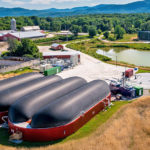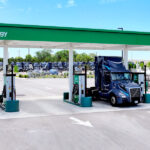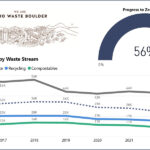Top: Accepted food scraps include coffee grounds, fruits and vegetables, meat and seafood, and eggs.
Boston Mayor Michelle Wu and the Public Works Department announced at the end of May that a curbside food waste collection program with rolling online enrollment is now available. Service begins August 1, 2022. In July, compost bin “starter kits” will be delivered to residents who have enrolled in the program. The starter kits include an onboarding manual, a roll of liners, kitchen bin, collection bin, and a magnet outlining what food scraps are and are not accepted in the program. Accepted materials include common household food scraps such as coffee grounds, fruits and vegetables, meat and seafood, and eggs.
Food waste collection will align with residents’ scheduled trash and recycling collection days. Garbage to Garden and Save That Stuff are partnered on the collection contract. Material will be sent to Save that Stuff’s composting site in West Bridgewater (MA) and to Waste Management’s CORe Facility in Charlestown where it will be slurried and hauled to the Greater Lawrence Sanitary District for codigeston with biosolids. “Curbside food waste collection is an important example of how we can each have an impact in moving our city toward sustainability with how we dispose of our food scraps,” said Mayor Wu. “Making it easier and more accessible for residents to compost diverts our City’s waste from landfills and incineration, so Boston can be a Green New Deal city. I encourage everyone interested to sign up, and I’m excited to see how the program grows in the years to come.”

In addition to the curbside pilot, the City of Boston is expanding the number of Project Oscar food scraps drop-off sites available to residents. Photos courtesy of City of Boston Public Works
Any Boston resident who lives in a residential building with six units or less is eligible to enroll in the curbside program. The City is prioritizing enrollment to residents in vulnerable communities, based on the state’s criteria for environmental justice communities coupled with proximity to a Project Oscar compost drop-off site. This year’s curbside collection program will have a cap of 10,000 households for the first year, with the goal of adding 10,000 or more every year, depending on demand. The City is expanding Project Oscar, its food waste drop-off program. Launching this summer, it will be partnering with farmers markets and community gardens to roll out nearly 25 new sites across Boston.













